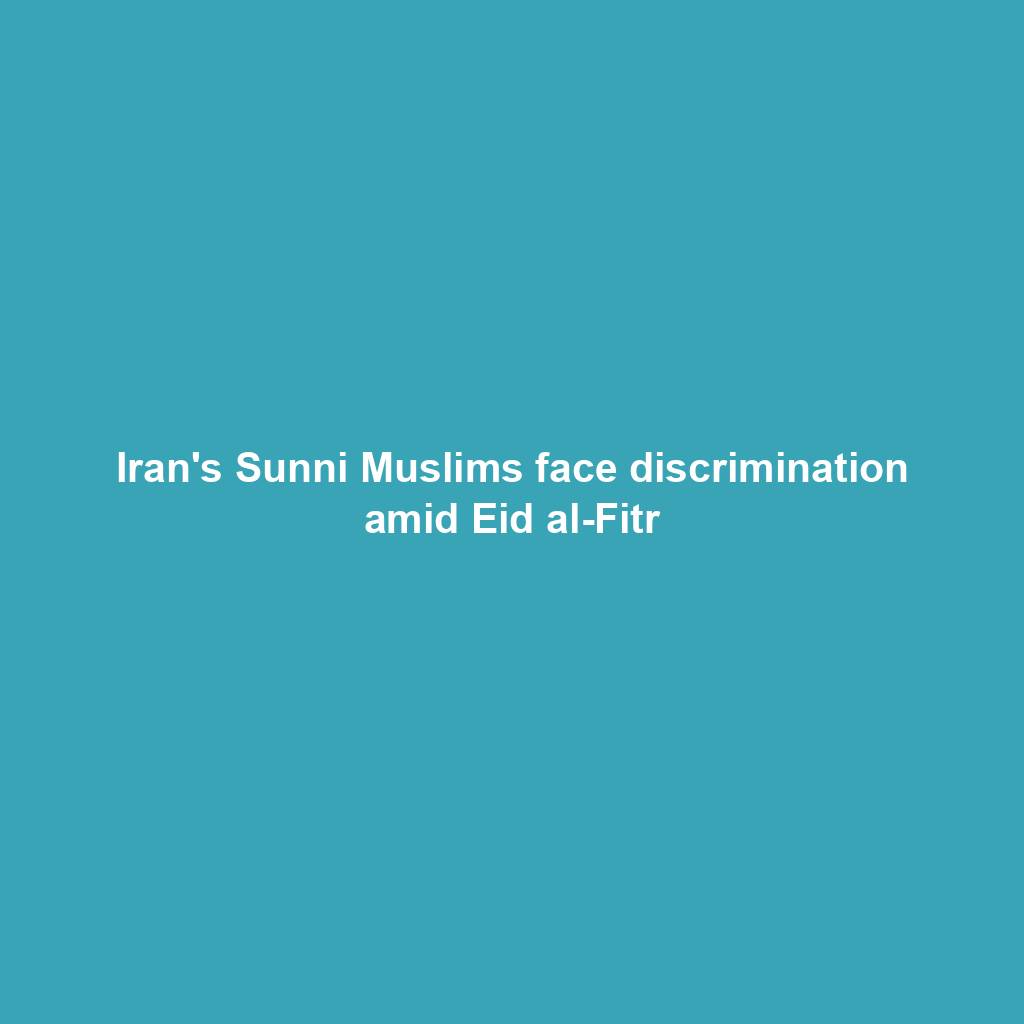On April 9, hundreds of thousands of Muslims all over the world will rejoice Eid al-Fitr, which marks the top of the fasting month of Ramadan. On this main vacation within the Islamic calendar, religious Muslims have a tendency to start the day with a communal prayer. However Iranian girls’s rights activist Fariba Balouch stated that when once more this yr, this won’t be potential for Sunnis within the Iranian capital, Tehran.”Even 45 years after the founding of the Islamic Republic in Iran, they still do not have their own mosque to celebrate this festival with a communal prayer,” she instructed DW.Balouch, who has lived in exile in London for 4 years, was born right into a Sunni household within the jap Iranian province of Sistan and Baluchistan, which is situated on the border with Pakistan and Afghanistan. Virtually half of the province’s inhabitants of three.2 million is Sunni. It’s estimated that, total, Shiite Muslims make up 10% of the inhabitants in predominantly Shiite Iran.”We are oppressed because of our religion,” stated Balouch. “Sunnis in Iran are not allowed to hold any important political offices; they cannot become president or head of the judiciary, nor can they be members of the Guardian Council or establish political parties or own newspapers or magazines. We are not even second-class citizens: we have virtually no rights.”Hardly any of the earnings from the extraction of pure assets, similar to oil and fuel, reaches Sistan and Baluchistan, considered one of Iran’s poorest provinces. There are few faculties within the small cities and villages; electrical energy and water provides are poor. Water is scarce due to persistent drought and poor administration in agriculture.The province, in addition to the opposite areas on the nation’s borders by which Sunni Muslims stay, are systematically deprived. The Sunni minorities in Iran embody the Turkmen within the northeast, the Kurds within the west, Arabs within the southwest and Baluchis within the southeast.Shiite Islam turned Iran’s official faith in sixteenth centuryOf the roughly 1.6 billion Muslims on the planet, an estimated 85% to 90% are Sunnis. Shiites are solely within the majority in Iran, Iraq, Azerbaijan and Bahrain.In Iran, Shiite Islam has dominated for the reason that sixteenth century when Ismail I, the primary shah of Safavid Iran, declared it to be the official faith of the Persian Empire. To strengthen Iran’s protection in opposition to the Ottoman Empire, he exploited sectarian conflicts and offered himself because the patron of the Shiites.”Iran’s Shiite rulers demand absolute obedience and loyalty from the country’s Sunni minorities,” Hojjatoleslam Hasan Yousefi Eshkevari, a Shiite cleric who’s considered one of Iran’s best-known students of Islam, instructed DW.In 2000, he was sentenced to demise by a Particular Courtroom for Clerics after expressing criticism of Iran’s ruling clergy. The sentence was later transformed to a jail time period. He was launched in 2005 and went into exile in Germany.”Since the 1979 revolution, the rulers have fought and suppressed any difference of opinion,” he stated. “This affects religious minorities — such as Sunnis, Sufi orders and Bahai, as well as Shiites with dissenting views — whose beliefs are interpreted in the Islamic Republic as anti-Shiite.”Along with the political and non secular authorities on the middle of the Islamic Republic of Iran, there are different Shiite students who assist the restrictions on Sunnis in Iran. The refusal to construct a Sunni mosque within the capital is principally as a result of hidden stress from the non secular authorities within the nation’s Shiite middle within the metropolis of Qom. They’re unofficially and secretly utilizing their affect to stop this.”‘We will never forget the massacre’The pressure on Sunni minorities has grown over the past two years. After the death in police custody of the 22-year-old Kurdish Iranian woman, Jina Mahsa Amini, the capital of Sistan and Baluchistan, Zahedan, became a stronghold of the nationwide protests. For months, demonstrators would gather on the streets after Friday prayers.On September 30, 2022, more than 80 people were shot dead by the security forces. Some had taken up positions on the roofs around the city’s Grand Mosque, the largest Sunni mosque in Iran, and opened fire on a crowd that had gathered after Friday prayers.”We are going to always remember the bloodbath,” said women’s rights activist Balouch. “In entrance of this mosque in an Islamic nation, religious Muslims have been shot as a result of they have been protesting peacefully. That alone reveals what civil rights Sunni minorities have, particularly none in any respect!”The variety of executions in Iran has risen dramatically previously two years. Some 20% of the folks executed in 2023 belonged to the nation’s Sunni Baluch minority. As an entire, one in 20 Iranians are Sunni Baloch.
#Irans #Sunni #Muslims #face #discrimination #Eid #alFitr
For more information, check out these articles:
